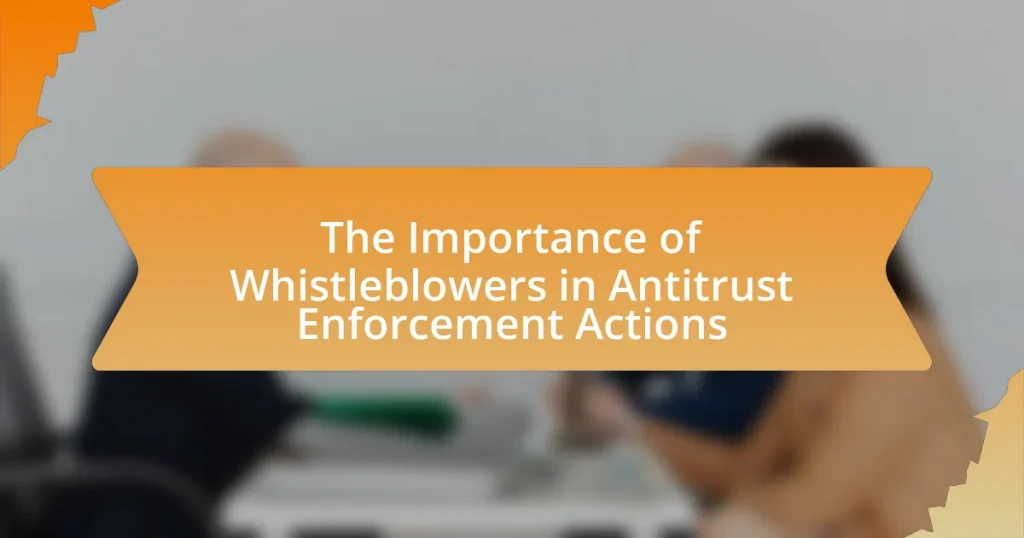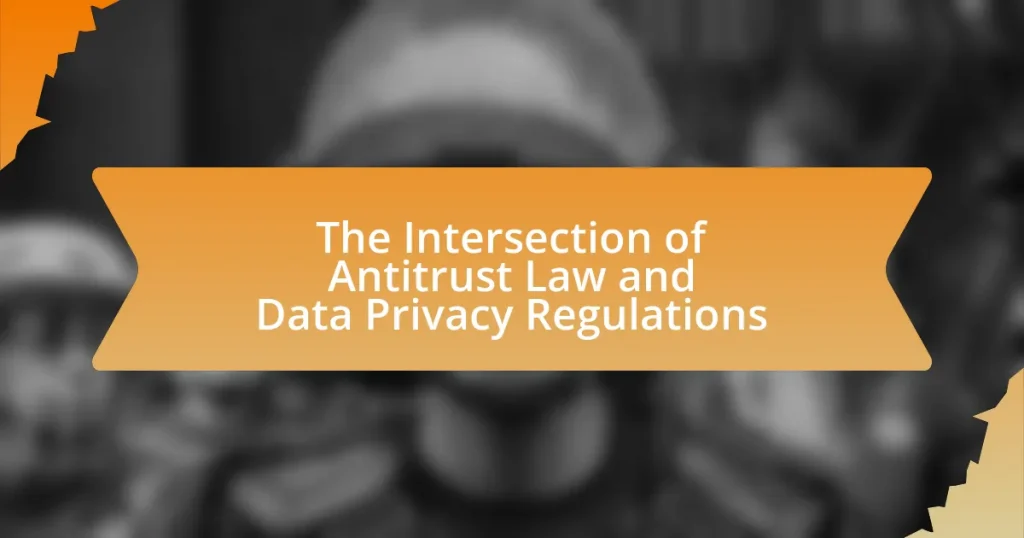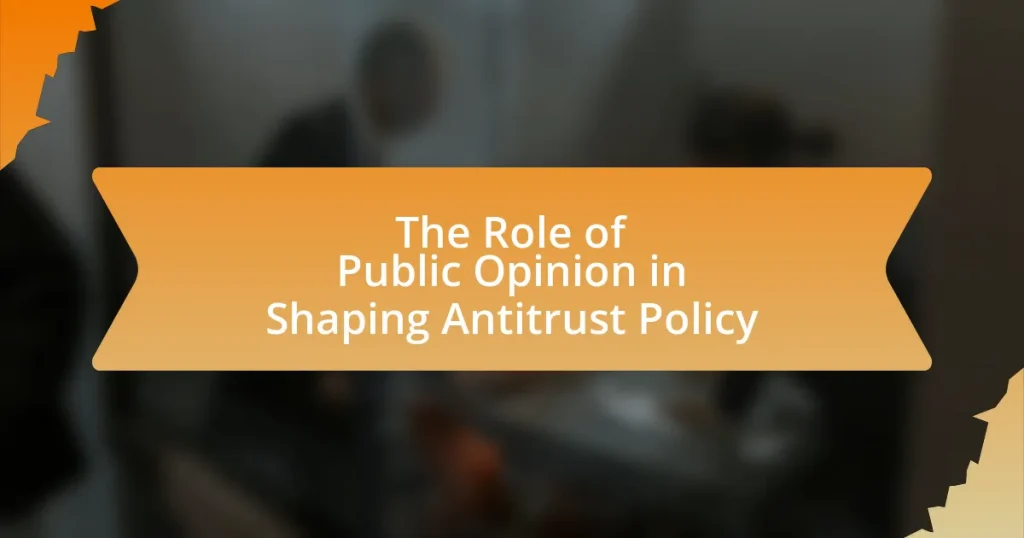Whistleblowers play a vital role in antitrust enforcement actions by providing insider information that helps uncover anti-competitive practices such as collusion and price-fixing. Their disclosures are crucial for regulatory bodies like the U.S. Department of Justice, which has successfully prosecuted numerous cases based on whistleblower tips, resulting in significant fines and changes in corporate behavior. The article explores how whistleblowers contribute to identifying antitrust violations, the types of information they provide, the protections available to them, and the impact of their involvement on corporate compliance and market integrity. Additionally, it discusses the challenges regulators face without whistleblower input and the best practices for individuals considering reporting antitrust misconduct.
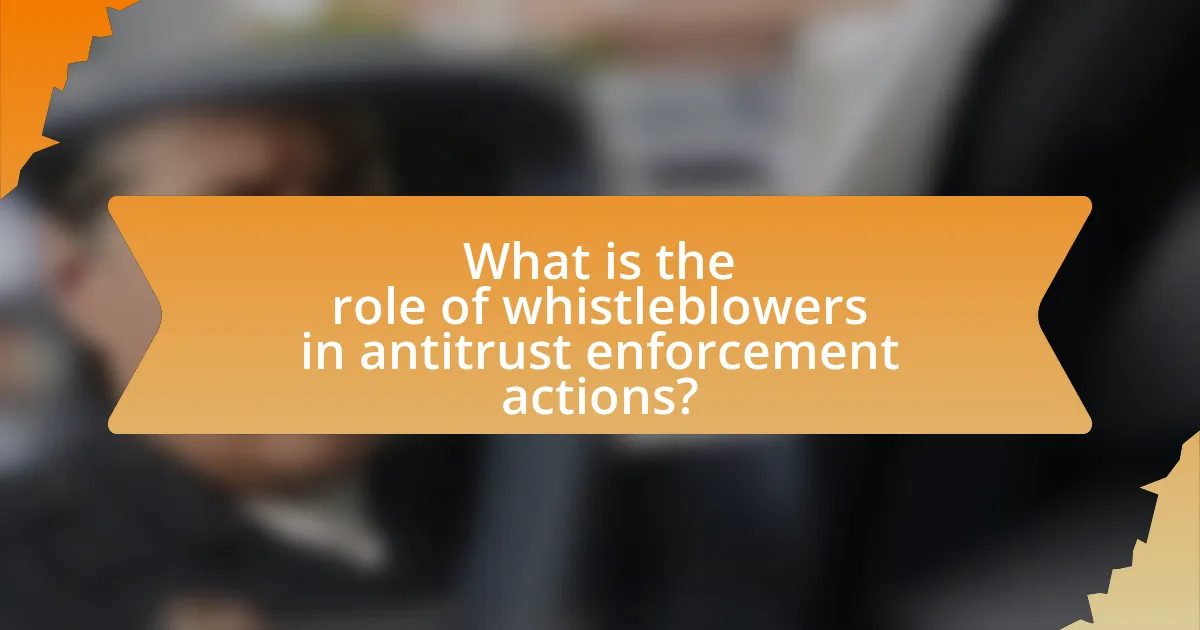
What is the role of whistleblowers in antitrust enforcement actions?
Whistleblowers play a crucial role in antitrust enforcement actions by providing insider information that can lead to the detection and prosecution of anti-competitive practices. Their disclosures often reveal collusion, price-fixing, or monopolistic behavior that may not be easily observable by regulators. For instance, the U.S. Department of Justice has successfully pursued cases based on whistleblower tips, which have resulted in significant fines and changes in corporate behavior. This underscores the importance of whistleblowers in maintaining market integrity and promoting fair competition.
How do whistleblowers contribute to identifying antitrust violations?
Whistleblowers contribute to identifying antitrust violations by providing insider information that reveals anti-competitive practices within organizations. Their firsthand knowledge often uncovers collusion, price-fixing, or market manipulation that may otherwise remain hidden. For instance, the U.S. Department of Justice has successfully prosecuted numerous antitrust cases based on whistleblower reports, demonstrating the critical role these individuals play in enforcement actions. In 2020, the Antitrust Division of the DOJ reported that whistleblower tips led to significant investigations, highlighting their effectiveness in exposing violations that harm market competition.
What types of information do whistleblowers typically provide?
Whistleblowers typically provide information regarding illegal activities, unethical practices, or violations of laws and regulations within organizations. This can include evidence of fraud, corruption, antitrust violations, safety violations, or financial misconduct. For instance, in antitrust enforcement actions, whistleblowers may disclose collusion among competitors, price-fixing schemes, or deceptive marketing practices that harm consumers and competition. Such disclosures are crucial as they often lead to investigations and enforcement actions by regulatory bodies, thereby promoting accountability and transparency in the marketplace.
How does whistleblower information lead to successful antitrust cases?
Whistleblower information leads to successful antitrust cases by providing critical evidence that can uncover anti-competitive practices. This information often includes insider knowledge about collusion, price-fixing, or market manipulation that may not be accessible through traditional investigative methods. For instance, the U.S. Department of Justice has successfully prosecuted numerous antitrust cases based on whistleblower tips, which have resulted in significant fines and changes in corporate behavior. In 2019, the DOJ secured a $1.5 billion settlement from a major company due to whistleblower disclosures regarding illegal price-fixing activities. Such cases demonstrate how whistleblower insights can be pivotal in identifying and proving violations of antitrust laws, ultimately leading to enforcement actions that protect market competition.
Why are whistleblowers essential for effective antitrust enforcement?
Whistleblowers are essential for effective antitrust enforcement because they provide critical insider information that can reveal anti-competitive practices. This information often uncovers collusion, price-fixing, and other violations that may not be detectable through traditional investigative methods. For instance, the U.S. Department of Justice has successfully prosecuted numerous antitrust cases based on whistleblower reports, demonstrating their role in exposing illegal activities that harm market competition. Without whistleblowers, many violations would remain hidden, undermining the integrity of the market and consumer welfare.
What challenges do regulators face without whistleblower input?
Regulators face significant challenges without whistleblower input, primarily the lack of critical information that can expose antitrust violations. Without insights from insiders, regulators may struggle to identify and investigate complex anti-competitive practices, as these activities often occur behind closed doors and are difficult to detect through traditional methods. For instance, the U.S. Department of Justice has noted that whistleblower reports can lead to the discovery of collusion or price-fixing schemes that would otherwise remain hidden. Additionally, the absence of whistleblower contributions can result in prolonged investigations, increased resource expenditure, and ultimately, a lower rate of successful enforcement actions against violators.
How do whistleblowers enhance transparency in antitrust investigations?
Whistleblowers enhance transparency in antitrust investigations by providing critical insider information that exposes anti-competitive practices. Their disclosures often reveal collusion, price-fixing, or other illicit activities that may not be detectable through standard investigative methods. For instance, the U.S. Department of Justice has reported that whistleblower tips have led to significant antitrust enforcement actions, resulting in substantial fines and penalties against corporations. This transparency not only aids regulatory bodies in their investigations but also fosters a culture of accountability within industries, encouraging compliance with antitrust laws.
What protections are in place for whistleblowers in antitrust cases?
Whistleblowers in antitrust cases are protected by various laws that prohibit retaliation against them for reporting violations. The most significant protections come from the Whistleblower Protection Act, which safeguards federal employees, and the Dodd-Frank Wall Street Reform and Consumer Protection Act, which provides incentives and protections for whistleblowers in financial and securities law violations, including antitrust matters. These laws ensure that whistleblowers can report illegal activities without fear of job loss or other forms of retaliation, thereby encouraging the reporting of antitrust violations.
What legal frameworks support whistleblower protections?
Legal frameworks that support whistleblower protections include the Whistleblower Protection Act of 1989 in the United States, which safeguards federal employees from retaliation for reporting misconduct. Additionally, the Dodd-Frank Wall Street Reform and Consumer Protection Act of 2010 offers protections and financial incentives for whistleblowers who report violations of securities laws. The Sarbanes-Oxley Act of 2002 also provides protections for employees of publicly traded companies who report fraudulent activities. These laws collectively create a robust environment for whistleblowers, encouraging the reporting of illegal activities while ensuring their safety from retaliation.
How do these protections encourage more individuals to come forward?
Protections encourage more individuals to come forward by providing legal safeguards against retaliation and ensuring confidentiality. These measures create a safer environment for whistleblowers, reducing the fear of job loss or personal harm. For instance, the Dodd-Frank Act offers monetary rewards and protection from employer retaliation, which has led to a significant increase in whistleblower reports; the SEC reported a 20% rise in tips following the implementation of these protections. This legal framework empowers individuals to report antitrust violations without the risk of negative repercussions, thereby enhancing enforcement actions.
How can whistleblowers navigate the antitrust reporting process?
Whistleblowers can navigate the antitrust reporting process by first understanding the legal protections available to them, such as the Whistleblower Protection Act, which safeguards against retaliation. They should gather comprehensive evidence of antitrust violations, including documents, emails, and witness statements, to support their claims. Next, whistleblowers can report their findings to the appropriate authorities, such as the Federal Trade Commission or the Department of Justice, ensuring they follow the specific reporting guidelines provided by these agencies. Additionally, consulting with a legal expert specializing in antitrust law can help whistleblowers understand their rights and the implications of their disclosures. This structured approach is crucial, as it enhances the credibility of their reports and increases the likelihood of effective enforcement actions against antitrust violations.
What are the potential risks and rewards for whistleblowers in antitrust actions?
Whistleblowers in antitrust actions face significant risks and rewards. The primary risk includes retaliation from employers, which can manifest as job loss, harassment, or legal action against the whistleblower. According to the U.S. Department of Justice, whistleblowers may also experience social ostracism and damage to their professional reputation. Conversely, the rewards for whistleblowers can be substantial, including financial incentives through whistleblower reward programs that can offer a percentage of any monetary recovery resulting from the enforcement action. The Dodd-Frank Act, for instance, provides for rewards of 10% to 30% of the total monetary sanctions collected in successful cases. These dynamics illustrate the complex decision-making process for individuals considering whistleblowing in antitrust matters.
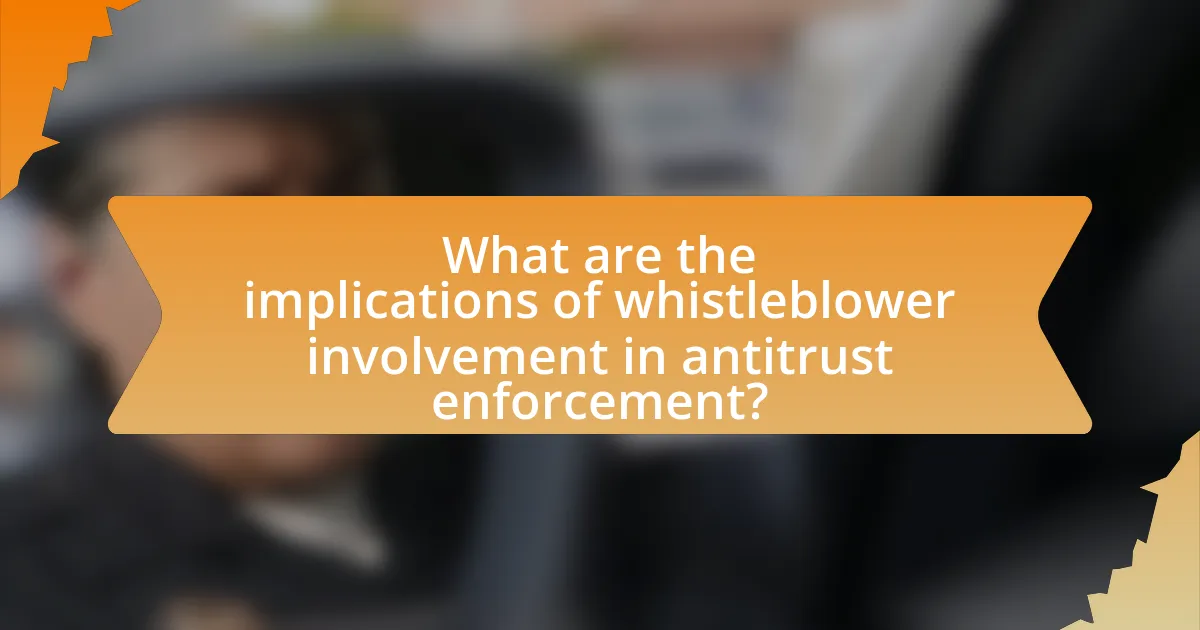
What are the implications of whistleblower involvement in antitrust enforcement?
Whistleblower involvement in antitrust enforcement significantly enhances the detection and prosecution of anti-competitive practices. By providing insider information, whistleblowers can expose collusion, price-fixing, and other violations that may otherwise remain hidden. For instance, the U.S. Department of Justice has reported that whistleblower tips have led to substantial fines and settlements, demonstrating their critical role in uncovering illegal activities. Additionally, the presence of whistleblower protections encourages individuals to come forward without fear of retaliation, thereby increasing the likelihood of reporting misconduct. This dynamic fosters a more competitive market environment, ultimately benefiting consumers and the economy.
How do whistleblower cases impact corporate behavior?
Whistleblower cases significantly impact corporate behavior by exposing unethical practices and promoting accountability. When employees report misconduct, it often leads to internal investigations, resulting in changes to corporate policies and practices to prevent future violations. For instance, a study by the Association of Certified Fraud Examiners found that organizations with whistleblower programs reported a 50% reduction in fraud losses. This demonstrates that whistleblower cases not only reveal wrongdoing but also incentivize companies to adopt more ethical standards and compliance measures, ultimately fostering a culture of transparency and integrity.
What changes in compliance practices can result from whistleblower actions?
Whistleblower actions can lead to significant changes in compliance practices by prompting organizations to enhance their internal reporting mechanisms and strengthen ethical guidelines. When whistleblowers expose misconduct, companies often respond by implementing more robust compliance training programs to prevent future violations. For instance, following high-profile whistleblower cases, organizations may adopt stricter policies regarding transparency and accountability, ensuring that employees feel safe to report unethical behavior without fear of retaliation. This is evidenced by the increased adoption of anonymous reporting systems and regular compliance audits in firms that have faced whistleblower allegations, which serve to reinforce a culture of integrity and adherence to legal standards.
How do whistleblower cases influence public perception of corporations?
Whistleblower cases significantly influence public perception of corporations by exposing unethical practices and fostering distrust among consumers. When whistleblowers reveal misconduct, such as fraud or safety violations, it often leads to negative media coverage, which can damage a corporation’s reputation and erode consumer confidence. For instance, the 2001 Enron scandal, revealed by whistleblower Sherron Watkins, resulted in a dramatic decline in public trust towards not only Enron but also the accounting industry as a whole. Research indicates that companies implicated in whistleblower cases often experience a drop in stock prices and customer loyalty, highlighting the tangible impact of these revelations on public sentiment.
What are the outcomes of successful antitrust enforcement actions initiated by whistleblowers?
Successful antitrust enforcement actions initiated by whistleblowers often result in significant penalties for the offending companies, including substantial fines and changes in business practices. For instance, the U.S. Department of Justice has imposed billions in fines on corporations found guilty of antitrust violations, directly influenced by whistleblower reports. Additionally, these actions can lead to increased market competition and consumer protection, as the exposure of anti-competitive practices often prompts regulatory reforms. The whistleblower may also receive financial rewards, as seen in the U.S. False Claims Act, which incentivizes reporting by providing a percentage of the recovered damages.
What penalties do companies face when whistleblower information leads to enforcement actions?
Companies face significant penalties when whistleblower information leads to enforcement actions, including hefty fines, legal costs, and potential criminal charges. For instance, under the Dodd-Frank Act, whistleblowers can trigger investigations that result in fines reaching millions of dollars, as seen in cases like the $2.3 billion fine imposed on Pfizer for illegal marketing practices. Additionally, companies may suffer reputational damage and loss of business, as enforcement actions often lead to increased scrutiny from regulators and the public. These penalties serve as a deterrent against anti-competitive behavior and underscore the critical role of whistleblowers in promoting compliance and accountability within industries.
How do successful cases affect future antitrust enforcement strategies?
Successful antitrust cases shape future enforcement strategies by establishing legal precedents and influencing regulatory priorities. These cases demonstrate the effectiveness of specific enforcement approaches, guiding agencies like the Federal Trade Commission and the Department of Justice in targeting similar anti-competitive behaviors. For instance, the landmark case against Microsoft in the late 1990s set a precedent for scrutinizing monopolistic practices, leading to increased vigilance in monitoring tech giants. Additionally, successful outcomes can encourage whistleblowers to come forward, as they see tangible results from their disclosures, thereby enhancing the overall effectiveness of antitrust enforcement.
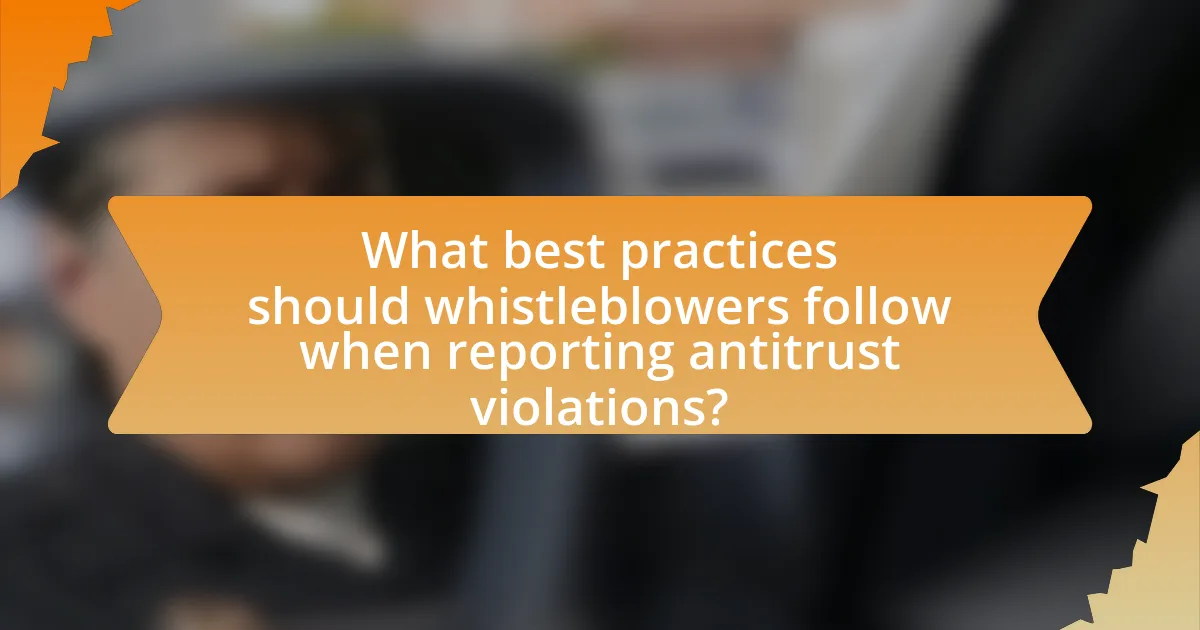
What best practices should whistleblowers follow when reporting antitrust violations?
Whistleblowers should document all relevant evidence meticulously when reporting antitrust violations. This includes gathering emails, memos, and any other communications that demonstrate the violation. Additionally, whistleblowers should report their findings to the appropriate regulatory authority, such as the Federal Trade Commission or the Department of Justice, ensuring they follow the specific procedures outlined by these agencies. It is also crucial for whistleblowers to maintain confidentiality to protect their identity and avoid retaliation, as laws like the Whistleblower Protection Act provide legal safeguards. Furthermore, seeking legal counsel can help whistleblowers navigate the complexities of reporting and ensure their rights are protected throughout the process. These practices enhance the credibility of the report and increase the likelihood of a successful investigation.
How can whistleblowers effectively document their claims?
Whistleblowers can effectively document their claims by gathering comprehensive evidence, including emails, memos, and recordings that substantiate their allegations. This documentation should be organized chronologically and include specific details such as dates, times, and the identities of individuals involved. For instance, a study by the Government Accountability Office found that whistleblower disclosures with detailed supporting evidence are more likely to lead to successful investigations and enforcement actions. Additionally, maintaining a secure record of communications and ensuring confidentiality can protect the whistleblower while enhancing the credibility of their claims.
What types of evidence are most compelling in antitrust cases?
Direct evidence of anti-competitive behavior, such as internal communications, pricing documents, and market analyses, is most compelling in antitrust cases. These types of evidence provide clear insights into the intentions and actions of companies involved in anti-competitive practices. For instance, emails or memos that discuss price-fixing or market allocation can serve as strong proof of collusion. Additionally, whistleblower testimonies often corroborate documentary evidence, enhancing its credibility and demonstrating the existence of unlawful agreements or practices. Historical cases, such as the United States v. Microsoft Corp., illustrate how internal documents and whistleblower accounts were pivotal in establishing anti-competitive conduct.
How should whistleblowers approach legal counsel for guidance?
Whistleblowers should approach legal counsel by first identifying attorneys who specialize in whistleblower protection and antitrust law. This ensures that the legal counsel is knowledgeable about the specific rights and protections available to whistleblowers under laws such as the Whistleblower Protection Act and the Dodd-Frank Act. Engaging with a qualified attorney allows whistleblowers to understand the legal implications of their disclosures, assess the strength of their case, and navigate the complexities of reporting misconduct. Legal counsel can also provide guidance on maintaining confidentiality and protecting against retaliation, which is crucial for the safety and security of the whistleblower.
What resources are available for potential whistleblowers in antitrust cases?
Potential whistleblowers in antitrust cases can access several resources, including legal counsel, government agencies, and nonprofit organizations. Legal counsel can provide guidance on the whistleblower process and protections under laws such as the Whistleblower Protection Act. Government agencies like the Federal Trade Commission (FTC) and the Department of Justice (DOJ) have dedicated divisions for reporting antitrust violations, offering anonymity and protection for whistleblowers. Nonprofit organizations, such as the National Whistleblower Center, provide resources, support, and advocacy for individuals considering reporting antitrust misconduct. These resources collectively empower whistleblowers to report violations while ensuring their rights and safety are protected.
Which organizations provide support and guidance for whistleblowers?
Organizations that provide support and guidance for whistleblowers include the Government Accountability Project, the National Whistleblower Center, and the Whistleblower Protection Program. The Government Accountability Project offers legal assistance and advocacy for whistleblowers, while the National Whistleblower Center focuses on educating and empowering individuals to report wrongdoing. The Whistleblower Protection Program, part of the U.S. Department of Labor, provides protections and resources for whistleblowers in various sectors. These organizations are recognized for their commitment to protecting whistleblowers and ensuring their voices are heard in matters of public interest.
How can whistleblowers stay informed about their rights and protections?
Whistleblowers can stay informed about their rights and protections by accessing resources provided by government agencies, legal organizations, and advocacy groups. The U.S. Department of Justice and the Securities and Exchange Commission offer guidelines and information on whistleblower protections under laws such as the Whistleblower Protection Act. Additionally, organizations like the National Whistleblower Center provide educational materials and legal assistance to help whistleblowers understand their rights. These resources ensure that whistleblowers are aware of the legal frameworks that protect them from retaliation and provide avenues for reporting misconduct safely.
